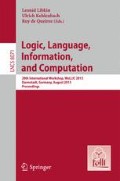Abstract
The first order logic \(\mathcal{R}ing(0,+,*,<)\) for finite residue class rings with order is presented, and extensions of this logic with generalized quantifiers are given. It is shown that this logic and its extensions capture DLOGTIME-uniform circuit complexity classes ranging from AC 0 to TC 0. Separability results are obtained for the hierarchy of these logics when order is not present, and for \(\mathcal{R}ing(0,+,*,<)\) from the unordered version. These separations are obtained using tools from class field theory, adapting notions as the spectra of polynomials over finite fields to sets of sentences in this logic of finite rings, and studying asymptotic measures of these sets such as their relative densities. This framework of finite rings with order provides new algebraic tools and a novel perspective for descriptive complexity.
Access this chapter
Tax calculation will be finalised at checkout
Purchases are for personal use only
Preview
Unable to display preview. Download preview PDF.
References
Ax, J.: Solving diophantine problems modulo every prime. Ann. of Math. 85(2), 161–183 (1967)
Ax, J.: The elementary theory of finite fields. Ann. of Math. 88(2), 239–271 (1968)
Barrington, D., Immerman, N., Straubing, H.: On uniformity within NC1. J. Computer and Syst. Sci. 41, 274–306 (1990)
Boppana, R., Sipser, M.: The complexity of finite functions. In: van Leeuwen, J. (ed.) Handbook of Theoretical Computer Science. Algorithms and Complexity, vol. A, pp. 757–804. Elsevier (1990)
Borodin, A.: On relating time and space to size and depth. SIAM J. Comput. 6(4), 733–744 (1977)
Ebbinghaus, H.D., Flum, J.: Finite Model Theory. Springer (1995)
Friedlander, J., Iwaniec, H.: Using a parity-sensitive sieve to count prime values of a polynomial. Proc. Natl. Acad. Sci. USA 94, 1054–1058 (1997)
Immerman, N.: Descriptive Complexity. Springer (1998)
Gerst, I., Brillhart, J.: On the prime divisors of polynomials. American Math. Monthly 78(3), 250–266 (1971)
Lagarias, J.C.: Sets of primes determined by systems of polynomial congruences. Illinois J. Math. 27(2), 224–239 (1983)
Wyman, B.F.: What is a Reciprocity Law? American Math. Monthly 79(6), 571–586 (1972)
Author information
Authors and Affiliations
Editor information
Editors and Affiliations
Rights and permissions
Copyright information
© 2013 Springer-Verlag Berlin Heidelberg
About this paper
Cite this paper
Arratia, A., Ortiz, C.E. (2013). First Order Extensions of Residue Classes and Uniform Circuit Complexity. In: Libkin, L., Kohlenbach, U., de Queiroz, R. (eds) Logic, Language, Information, and Computation. WoLLIC 2013. Lecture Notes in Computer Science, vol 8071. Springer, Berlin, Heidelberg. https://doi.org/10.1007/978-3-642-39992-3_8
Download citation
DOI: https://doi.org/10.1007/978-3-642-39992-3_8
Publisher Name: Springer, Berlin, Heidelberg
Print ISBN: 978-3-642-39991-6
Online ISBN: 978-3-642-39992-3
eBook Packages: Computer ScienceComputer Science (R0)

